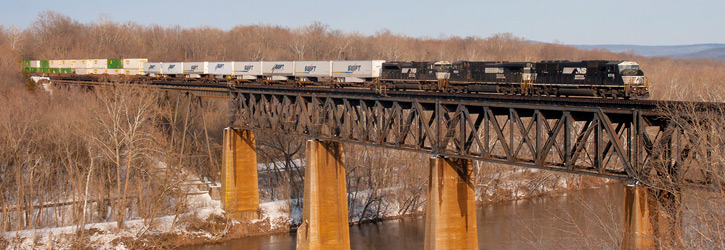
Intermodal Financial & Business Planning
The use of freight containers compatible with multiple modes of transportation, referred to as “Intermodal Transportation,” has experienced continued growth as freight customers and carriers seek ways to both increase freight volumes and efficiency. With decades of experience in this segment of the industry, RLBA provides its clients with assessing, planning and executing successful Intermodal development projects.
Select Project Descriptions
PORT OF NEW YORK & NEW JERSEY:
RLBA developed rail intermodal operating plans and train cost estimates in connection with service between the client’s on-dock terminals and ten, prospective, inland terminals. Area railroads and documents were consulted to check double-stack clearances, crew work rules and commuter service windows. Maps were produced describing the prospective routes. RLBA then built a model which enabled comparisons of estimated costs per train between Port Authority terminals and the ten prospective inland port locations. The cost model relied upon differences in crew-hours, train-hours and train-miles to facilitate comparison among the corridors that linked the port terminals with prospective terminals. RLBA’s cost analysis data was combined with drayage cost estimates from team members to produce estimated transportation costs per container.
MID-AMERICAN REGIONAL COUNSEL:
RLBA was retained to assist in understanding the nature of the rail intermodal business and the truck traffic which flows into and out of the six intermodal terminals in the Kansas City region as part of an interregional truck study. More specifically, RLBA developed survey plans and methodologies to comprehend truck movements in and out of the area intermodal terminals as well as analyzed the data and compiled the results. RLBA employed its proprietary model to estimate the capacity of those six terminals.
IOWA FALLS AREA DEVELOPMENT CORPORATION:
RLBA was engaged to explore, in two phases, the feasibility of developing a new, potentially jointly-served Union Pacific Railroad/ Canadian National Railway intermodal/transload terminal in Iowa Falls Iowa to improve the regional economy. First, the firm documented and assessed market demand by focusing on regional economic growth outlook and trade patterns and identifying and contacting more than one hundred potential shippers regarding transportation needs and market access requirements. RLBA then investigated the economic feasibility associated with establishing a new, intermodal/transload terminal by examining potential facility volumes, revenues and costs, while keeping in mind the institutional considerations necessary to fund, develop and operate the terminal. In the second-phase engagement, RLBA expanded the customer research by targeting three times as many firms and identifying twice as many prospects, as in the first phase.
